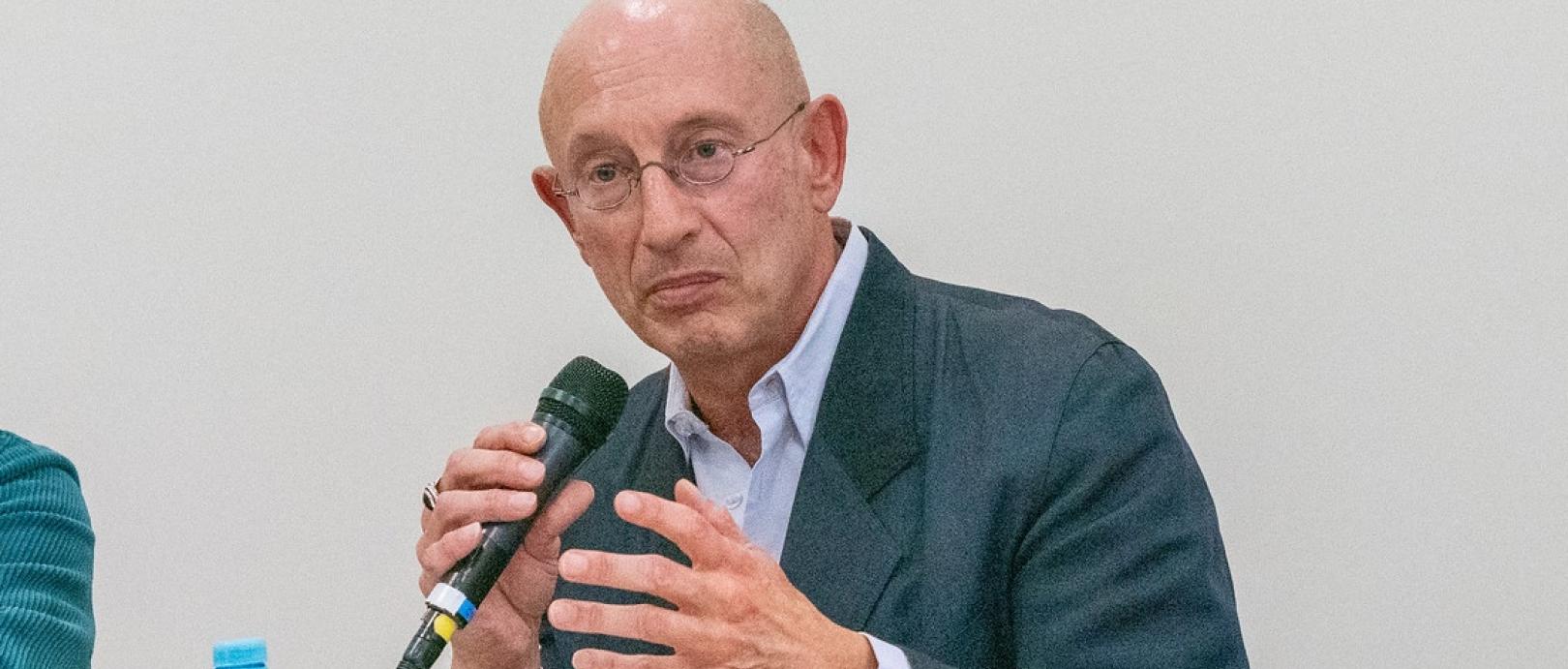MA in Diplomacy and International Law
The combined MA in Diplomacy and International Law is a dynamic degree that allows students to benefit from the best of both disciplines – a solid grounding in international relations theory and practice, as well as the analytical tools for legal advocacy.

AUP’s highly competitive one-year MA in Diplomacy and International Law trains students to work as international advocates for global justice. A range of cross-disciplinary courses in international relations, law, global ethics, conflict resolution and human rights provide the theoretical framework for innovative practice. Professional modules, like AUP’s Justice Lab, the Hague Practicum, the French War College Practicum and our innovative Summer Institute for Human Rights, engage students with professional expertise, rigorous role-playing and extensive contacts, enabling them to craft a unique skillset to advocate for better solutions to the world’s most intractable challenges.
The program takes advantage of the interdisciplinary nature of governments, non-profits, international institutions and businesses, training students to move easily across boundaries in advocating for the allocation of ideas, rights and resources in today’s world. Our graduates pursue careers in government, business, the United Nations or the NGO sector, or they may pursue further studies in law; all graduates utilize the wide range of skills acquired through the program to advocate for justice in challenging circumstances.
Masters in Diplomacy and International Law
- Duration 3 Semesters
- Entry time Fall
- Tuition and Fees €55,296
- Language English
-
Overview
While many universities offer degrees in Diplomacy, AUP’s degree is unique in that it situates diplomacy within the international legal framework.
The MA in Diplomacy and International Law is a 48-credit program during which students will engage with discipline-specific theoretical constructs through modules designed to enhance critical thinking, as well as graduate-level research and writing capacities.
The program is designed to allow students the flexibility to choose the courses that interest them the most, and cater to their focus within various fields of practice from law to international relations and diplomacy, and from conflict resolution to human rights.
Students take 16 credits in International Affairs courses, 8 credits in Law courses, select from 8 professional modules and complete two summer courses: the International Criminal Law Practicum and study trips to The Hague (6 credits) and the AUP Summer Institute for Human Rights (10 credits).
The Summer Institute is a particular highlight for many students. The dynamic 3-week program provides a rich and comprehensive understanding of human rights in the place where it all started - Paris. In addition to coursework and site visits, students exchange daily with 12 well-known human rights defenders from the United Nations, the International Criminal Court, the European Union, and other public and private institutions. The Institute explores the intersection between human rights law and other fields of human rights praxis, and examines the practical application of different human rights approaches in addressing global challenges.
Courses combine lectures, seminar discussion, case-method and student-directed projects. Within this context, a special emphasis is put on professional skills development and career development. Students also have the opportunity to collaborate with each other and program faculty for research projects and specialized directed study courses.
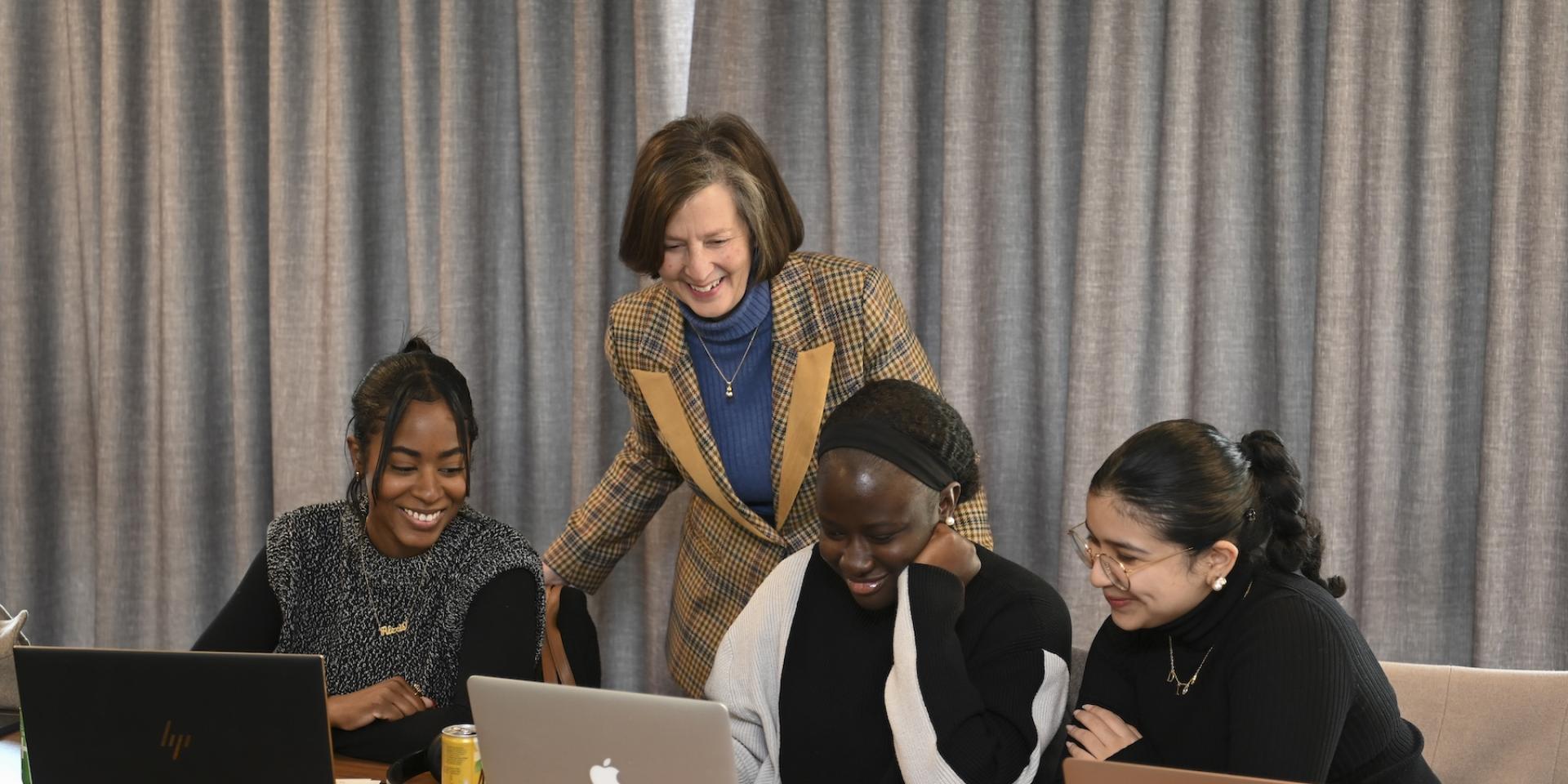
Learning Outcomes
Whether they go on to work in the public or private sector, the international outlook provided to graduates of the Diplomacy and International Law program offer students a one-up.
The program aims for students to:
- Be able to do an independent research and a well-structured written work;
- Demonstrating fluency in legal reasoning; developing a critical analysis of international law and its socio-political impact through case studies;
- Understanding of key concepts, relevant actors and main institutions of the international legal order; be able to apply the relevant rules of international law into specific cases.
Featured Course
International Public LawThis course introduces you to the nature, major principles, processes and institutions of the international legal system, the relationship between international and domestic law and the role of law in promoting world public order.

Internships and Employment
Research conducted in 2024 indicates that 95% of graduate alumni that graduated from The American University of Paris are in full-time employment, self-employed, entrepreneurs or pursuing further education. Our graduate programs provide academic excellence and practical knowledge that prepares you to successfully enter the international employment market after graduation.
During the course of their study, students are encouraged to build on their education by applying gained knowledge and skills through an internship. Internships, though usually unpaid, provide the crucial connection between theoretical knowledge and the real world experience that can ultimately kick start a professional career.
Our students have undertaken placements at the following places: the OECD, UNESCO, the International Chamber of Commerce (ICC), Bredin Prat, the US Embassy in Paris, Pour Une Planete sans Frontieres, African Artists for Development, Ogilvy & Mather Paris, Elan Edelman S.A.S., the United Nations, WLPGA, and Turner Broadcasting.
Structure
Suggested Timeline (Fall entry)
Fall Spring Summer 2 core courses
1 PO/LW elective
2 modules1 PO Core
2 PO/LW electives
2 modulesThe Hague Practicum (6 credits)
AUP Summer Institute for Human Rights (10 credits)16 credits 16 credits 16 credits Graduation
To graduate, students must maintain a cumulative grade point average (GPA) of 3.00. Students with a GPA of less than 3.00 will be placed on probation. Only two grades of C (or C+) may be counted towards an M.A. degree. Students do not earn credit for grades below C. The Walking period is flexible based on fall or spring entry. See the main graduation page.
-
Experiential Learning
As for all AUP programs, experiential learning is essential to gaining a global outlook and strong understanding of the issues facing graduates of the Masters in Diplomacy and International Law. While the curriculum lays the groundwork, field studies enhance the learning experience and provide real-world experience.
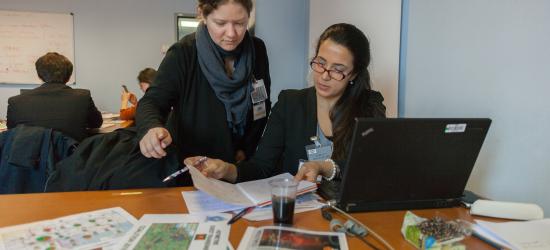
This field-based practicum prepares AUP students to play the role of international NGO humanitarian aid workers, responsible for providing relief to tens of thousands of civilians caught in the crossfire during the Exercise Coalition, a polyvalent simulation of military intervention organized and operated by the French War College (Ecole de Guerre) with civilian partners. Learning outcomes include the ability to respond to unexpected developments calmly and creatively; clear strategic thinking and mastery of material as demonstrated by contribution to humanitarian action plan, participation in group discussions in-class and onsite, and participation in on-site media interviews; and initiative and cooperation in working with mentors and other teams for operational roll-out.
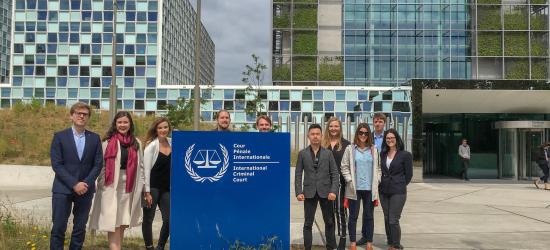
The Hague Practicum sends a select group of graduate students to The Hague, a dynamic international hub in the Netherlands, as part of a credit-receiving practicum. While at The Hague, students have the opportunity to experience first-hand the activity of international courts, such as the International Court of Justice and the International Criminal Court, or ad hoc tribunals, such as the Kosovo Specialist Chambers or the Special Tribunal for Lebanon. The practicum consists of one week of preparatory lectures at AUP at the start of the summer session followed by a one-week visit to The Hague, which includes 36 hours of onsite expert briefings and trial observation at the international courts.

AUP's Summer Institute for Human Rights is an exciting capstone for students in the MA in Diplomacy and International Law (MADIL) and is also an option for those taking the MSc in Human Rights and Data Science (HRDS). The three-week program is dedicated to exploring the intersection between human rights law and other relevant human rights fields. While examining the practical applications of human rights in a variety of careers and industries, students engage directly with experts and practitioners working to address global challenges through human rights.
Talking with people who actually work in these places was a great way to finish off the first two semesters. You don't get that kind of interaction through research or emails.
– Emily Burch -
Faculty & Lecturers
The greatest academic strength of AUP’s graduate programs is the vibrant nexus between teaching and research. The typical twenty-student classroom encourages extraordinary intellectual interactivity between faculty and students, an exchange reinforced by our proactive student advising system. In addition to animated exchange between faculty and students in the classroom, professors forge close mentorships and bonds with the graduate cohort. This exceptional relationship between faculty and students and its positive impact on teaching received a special commendation from the Middle States Association in their Accreditation Report.
The faculty of the Diplomacy and International Law Department represent the variety of modern communications with combined professional experience gained within the worlds of journalism, public relations, art, interpretation and academia. Their research and expertise translate into a number of peer-reviewed articles, books and conference appearances annually.
In the 2022-23 academic year, for example, the five full time faculty teaching core or elective courses delivered 28 workshops, conference presentations or invited talks. At the graduate level, our research assistantship program provides an opportunity for young scholars to work closely with their faculty mentors on publication projects in the discipline.
Program Director Susan Perry and Professor Claudia Roda appointed co-chairholders for a UNESCO Chair in Artificial Intelligence and Human Rights.
Selected Publications
Carlson, Kerstin Bree (2022). The Justice Laboratory: International Law in Africa. Brookings Institution Press
Golub, P. (2016) East Asia's Reemergence. Cambridge: Polity Press
Perry, S. and Roda, C. (2017) Human Rights and Digital Technology. London: Palgrave Macmillan UK
Weill, S. (2022) and Laurent, S. “Entretien croisé : discussion sur le lawfare.” Raisons politiques, vol. 85, no. 1, 2022, pp. 117–25.
 Neal BaerLecturer
Neal BaerLecturer Julian CulpAssociate Professor
Julian CulpAssociate Professor Matthew FraserProfessor
Matthew FraserProfessor Philip GolubProfessor
Philip GolubProfessor Karla HooverLecturer
Karla HooverLecturer Rébar JaffLecturer
Rébar JaffLecturer Sophie MeritetLecturer
Sophie MeritetLecturer Susan PerryProfessor, Program Director MAs in International Affairs
Susan PerryProfessor, Program Director MAs in International Affairs Simon RaiserLecturer
Simon RaiserLecturer Miranda SpielerProfessor
Miranda SpielerProfessor Charles TalcottAssociate Professor
Charles TalcottAssociate Professor Sharon WeillAssociate Professor
Sharon WeillAssociate Professor Roman ZinigradAssistant Professor
Roman ZinigradAssistant Professor -
Careers
Students come to the MA in Diplomacy and International Law from a variety of backgrounds, countries, previous degrees and careers. Regardless of the experiences under students’ belts upon arrival in Paris, the diversity of the cohort is guaranteed.
Small classrooms allow students to develop the fundamental skills necessary to careers in diplomacy or international law, which include participation in debate and confronting their own perspectives to those of others. Students of this program engage in collaborative research initiatives, fact-checking and practica that require thinking outside the box, and therefore rely on each other and their professors to find solutions to real-world problems.
As AUP also offers an MA in International Affairs, some crossover between cohorts will take place due to shared courses, which offers students even more opportunities for exchange.
- 0
-
Average age in the MADIL classroom
- 0
-
Average number of students to faculty in AUP classrooms.
Strong Graduate Employment
Research conducted in the last ten years indicates that close to 9 out of every 10 graduate alumni that graduated from The American University of Paris have found a job, become entrepreneurs or pursued additional educational routes within one year of graduation. Our graduate programs provide academic excellence and practical knowledge that prepares you to successfully enter the international employment market after graduation.
Internships
During the course of your study, you are encouraged to build on your education at AUP by applying gained knowledge and skills. An internship provides you with the crucial connection between theoretical knowledge and the real world experience that can ultimately kick start your professional career.
Our students have undertaken placements with companies that include: OECD, UNESCO, International Chamber of Commerce (ICC), Bredin Prat, US Embassy Paris, Pour Une Planete sans Frontieres, African Artists for Development, Ogilvy & Mather Paris, Elan Edelman S.A.S., United Nations, WLPGA, Turner Broadcasting.
CareersGraduates acquire both the fundamental knowledge and practical skills necessary for careers in international law, diplomacy and global advocacy.
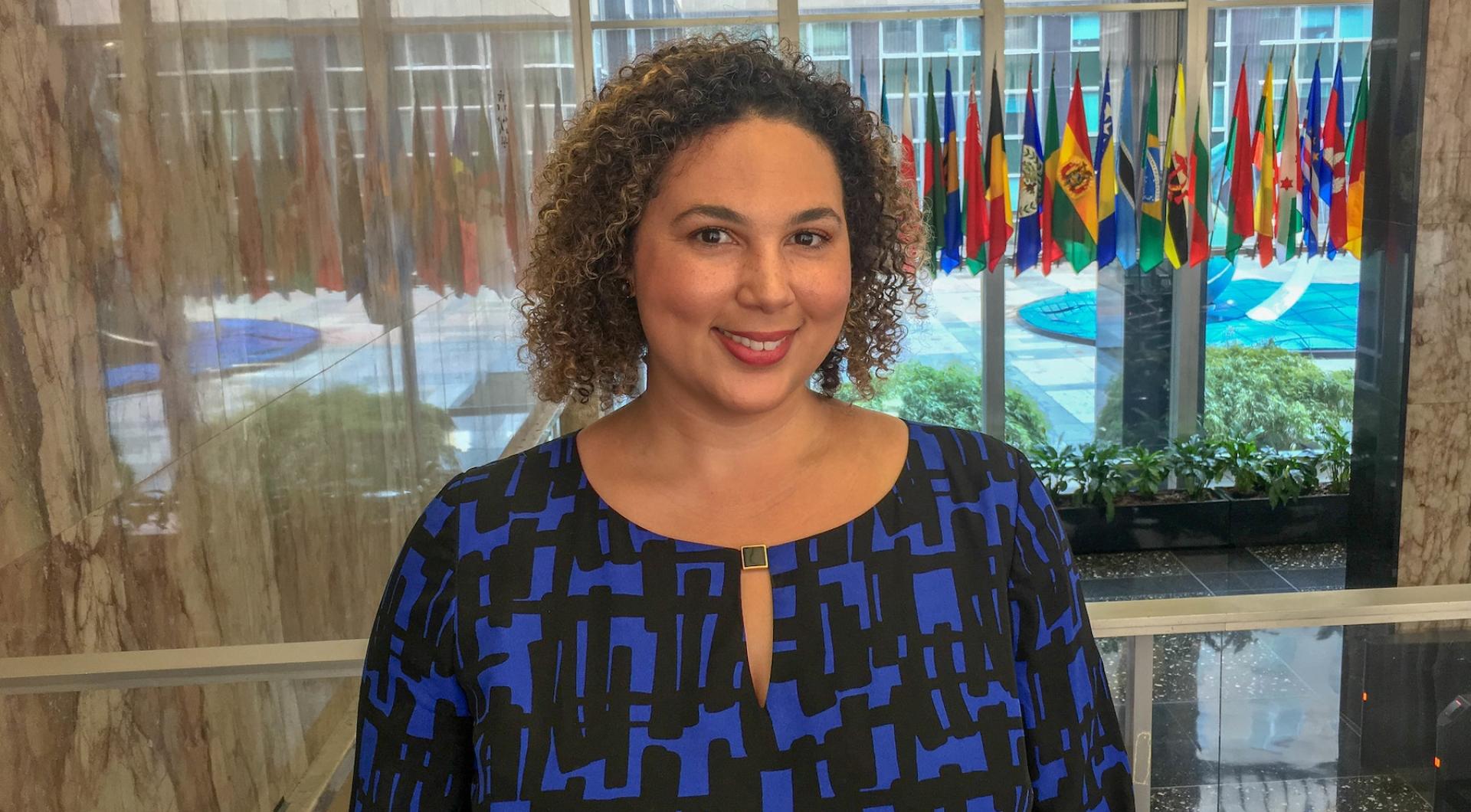 Career Support Services
Career Support ServicesAUP’s Center for Academic, Career and Experiential Advising (ACE) supports graduate students in defining, planning and developing their career pathway both during their degree and following graduation.

What Our Alumni Are Up To Now
Graduates acquire both the fundamental knowledge and practical skills necessary for careers in international law, diplomacy and global advocacy. Those who enter the program with a Law degree may go onto work in the international legal system or for high-paying consultancies. Others may go on to integrate top law schools, or work as advocates or policy analysts for international institutions.
Anna Chapman ’20 represented New Zealand at the UN and now, as a Senior Policy Analyst, uses her AUP training to advance women’s rights.
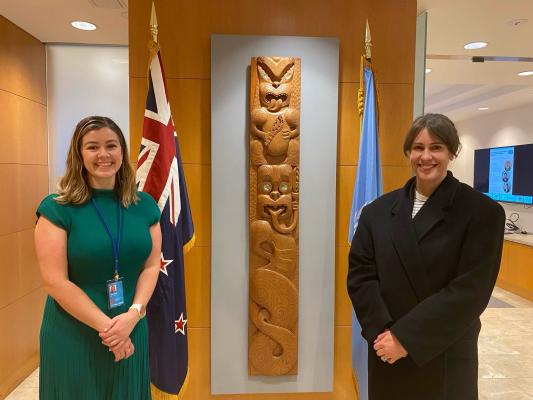
-
Admissions
AUP’s graduate programs welcome applications from motivated, high-caliber individuals who feel they will thrive in AUP’s international and dynamic environment. When assessing applications, we take a holistic approach to identifying the next cohort of Graduate Global Explorers, considering education, experience and general fit with AUP values and curriculum. Students can pursue our innovative program in Paris in the MA in Diplomacy and International Law program in the Fall.
Applicant Profiles
The MA in Diplomacy and International Law is looking for graduates with sharp analytical skills and the ability to think outside the box. Graduates in International Relations, Diplomacy, International Law and other social science disciplines. Applicants with professional experience in the diplomatic or legal fields are also welcome.
Tuition and Scholarships
Depending on the length of your graduate program, the cost will vary. Find out more about tuition and costs for the MA in Diplomacy and International Law.
AUP offers need- and merit-based scholarships to graduate students. The majority of our financial awards range from 25 percent to 50 percent of tuition and the average award amounts to about 30 percent.
Application Process
- TOEFL - Internet Based Test (ibT) minimum score: 101. To have your results sent directly to The American University of Paris, use our institutional code 0866.
- Cambridge English - Advanced, or Proficiency level, minimum score: 185.
- TOEIC - Listening and Reading, minimum score 910. To have your results sent directly to The American University of Paris, use our institutional code 0866.
- IELTS - Academic Option, minimum score 7.0.
- Duolingo English Test: The test must include sub-scores for the 4 component elements. Minimum score required: 130.
- You have been living in Australia, Canada, Ireland, New Zealand, South Africa, the United Kingdom or the United States for at least two consecutive years and have recently studied in an all-English curriculum.
- You have studied for at least four years in an all-English curriculum in any other country, although we continue to reserve the right to request English test results from any applicant.
You can start your application process by creating an account on AUP’s Application Portal. You will be able to return to this page to finish and review your application prior to submission as often as you like.
Online Form
Each graduate program has its own application via the AUP Application Portal. You may only apply to one program.
The form will ask you to complete various details including contact details, background information and educational history. Your application will also require several supporting documents which can be uploaded directly in your online application in .pdf or .doc formats.
Transcripts
We require official transcripts covering all previous university coursework, including confirmation of an awarded bachelor’s degree or equivalent. All official documents must be submitted in English or French, or with a certified translation into one of these two languages. We recommend your transcripts demonstrate a minimum 3.0 cumulative grade point average (or equivalent).
Personal Statement
Applicants are required to submit a 500-word personal statement describing their reasons for applying to the program of their choice, drawing on relevant past undergraduate research or professional experience, as well as your career objectives.
Program Specific Items
Standardized tests: GRE or LSAT required. Exemptions from this requirement are given to students from non-American universities and institutions, applicants with an M.A. degree, and mid-career applicants with a minimum of five years of professional experience following graduation.
Essay: In a concise 1000-word essay, please provide us with an example of when you might have been called upon to ‘think outside of the box’ in your academic, professional or personal life. We are particularly interested in why this example was important to you.
CV / Resume
Applicants should submit a C.V. or resumé including university and/or employment history; community involvement; professional, and/or university extracurricular activities; and recognitions and achievements.
Letters of Recommendation
We require two letters of recommendation from individuals well-qualified to provide us with first-hand knowledge about your potential for graduate study, with at least one letter from a university professor if you graduated in the last five years.
Veteran & Military Applicants: One of your letters of recommendation should ideally come from a Commanding Officer.
When you have entered the contact details for your recommenders to your application, AUP will approach them for their recommendation.
English
Students must demonstrate sufficient fluency in English. If English is not your first language, we require you to submit results less than two years old from one of the following tests:
The English language test requirement is waived if you meet one of the following criteria:
We reserve the right to request English test results from any applicant.
When you have completed your application, you will be asked to review the application and confirm that you are satisfied with the application before final submission. There is a non-refundable €75 processing fee to be paid at this point.
When AUP has received all of the documents (including responses from your recommenders), the Admissions Committee will review your application. In some cases the committee may come back to you for additional information. A review takes approximately four weeks from when the final documents are received.
When the Admissions Committee has reached its decision, an email will be sent to the address provided asking you to log-on to the Application Portal to view the decision.
Deadlines
We review completed applications in rounds throughout the year. We encourage you to apply early: priority for admission and financial aid is given to those who apply in the earlier rounds.
Fall Admission
Review Rounds Application Round Deadline Priority Admission by February 1st Regular Admission by March 31st Late or International Regular admission after April 1st (based on available spaces) -
Requirements: MA in Diplomacy and International Law (48 Credits)
Graduate students must maintain a cumulative grade point average (GPA) of 3.00. Students with a GPA of less than 3.00 will be placed on probation. Only two grades of C (or C+) may be counted towards an M.A. degree. Students do not earn credit for grades below C.
ALL COURSES CARRY FOUR (4) CREDITS UNLESS OTHERWISE NOTED.
Please note that all requirements from previous years can be found in our archive catalogs.
International Affairs Courses (16 credits)
Course Code Course Name PO5005 Philosophical Foundations of International Relations PO5075 École de Guerre Practicum Select two courses from the following list.
Course Code Course Name PO5025 Communication & the Global Public Sphere PO5026 Politics & Economics of Global Media PO5072 US & World Affairs PO5091 Topics in Politics (subjects may include: Geopolitics of Emerging Countries; Digital Advocacy and Social Movements) Modules (8 credits)
Course Code Course Name PO5002MOD Select four (2 credits each) Law Courses (8 credits)
Course Code Course Name LW5000 International Public Law Select one course (4 credits) from the following list.
Course Code Course Name LW5020 Comparative Law LW5080 / PO5080 Women, Conflict Resolution & International Law LW5091 / PO5091 Topics in Law/Topics in Politics (subjects may include: Rule of Law in Russia and China; Islam and Law; Transitional Justice) Summer Session Requirements (16 credits)
Course Code Course Name LW5085 International Criminal Law Practicum & Hague Trip (6 credits) LW5091 AUP Summer Institute for Human Rights (10 credits) Required GPA
Graduate students must maintain a cumulative grade point average (GPA) of 3.00. Students with a GPA of less than 3.00 will be placed on probation. Only two grades of C (or C+) may be counted towards an MA degree. Students do not earn credit for grades below C.
- Overview
- Experiential Learning
- Faculty
- Careers
- Admissions
- Requirements

